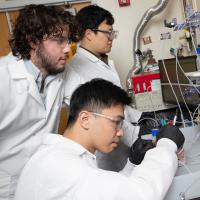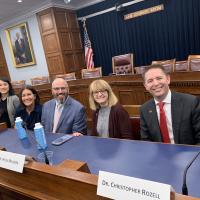3 min read
Under Van Hentenryck, the AI Hub will focus on developing trustworthy AI for social impact in science, engineering, and education.
3 min read
Stroud joins nine newly appointed Fellows and ten ESA Early Career Fellows, elected for "advancing the science of ecology and showing promise for continuing contributions" in the field.
3 min read
The event brought together faculty, researchers, and students to celebrate the Institute’s interdisciplinary space research.
2 min read
Program pairs U.S. academics and professionals with institutions abroad to share expertise, strengthen relations, hone skills, gain international experience, and learn about other cultures.
3 min read
Trammell Crow Company delivers first phase of Georgia Tech district devoted to advancing sciences that improve the human condition
1 min read
A team led by Marta Hatzell designed a new electrochemical reactor to seamlessly integrate into direct air capture systems and turn CO2 into useful raw materials.
3 min read
Board of Regents' Distinctions honor the recipients for their outstanding contributions and excellence.
3 min read
Buddy Carter visit focused on scope of innovation to address challenges
2 min read
On a recent visit to the Georgia Tech campus, Secretary of Energy Jennifer Granholm announced that a tri-city alliance of Atlanta, Decatur, and Savannah in partnership with Georgia Tech will receive funding to drive clean energy solutions.
4 min read
Chris Rozell traveled to Washington, D.C. to share the impacts of the past decade of brain research funded by the NIH BRAIN Initiative with Congress — and share with local representatives how Georgia Tech is playing a key role in leading the charge.















